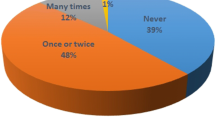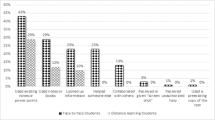Abstract
Numerous academic studies and reports indicate that as many as half of all students cheat on exams. Cheating on exams undermines the central purpose of a university, corrupts the meaning of grades as a measure of subject matter mastery, and significantly harms honest students. Although instructors are aware that many students cheat and they clearly oppose the behavior, they do little to punish cheaters. Accusing, prosecuting and convicting cheaters are time intensive, stressful and potentially costly activities for which faculty members receive few rewards. In this paper, we derive an equation to estimate the benefit that can be gained by a student who copies on a multiple choice exam. We then propose an exam design that not only eliminates the benefit, but also proportionately punishes cheaters, with little to no cost to instructors. Moreover, the exam system we propose can allow an instructor to determine, with a high degree of certainty, the odds that any student seated anywhere in the classroom cheated on any part of the exam.
Similar content being viewed by others
Notes
Interestingly, in this same study, 93 % of students said they were taught as children to behave ethically no matter the cost and 85 % claimed that the adults who most influenced their lives set good ethical examples. Based on these responses, the percent of students who actually cheated on an exam is in all likelihood higher than those who admit they cheated.
Although our technique works best in large class sections that use multiple choice or simple solution exams that are mainly problem oriented, extensions to other types of exams are possible.
The authors of this paper estimate that during their careers prior to implementing this exam design, they have given approximately 21,000 exams. They have accused 19 students of cheating (Pa = .0009), prosecuted 7 of these students (P p|a = .3684), and had two of these convicted (P c|a|p = .2857). To a student estimating the cost of being suspended or expelled by these professors, the probability of being convicted is (.0009)(.3684)(.2857) = .000095. Our guess is that most instructors reading this paper have similar probabilities.
The majority of multiple choice questions have five answer choices. The second most common type of question has four answer choices. For four answer choice exams, the only necessary change in the following equations is to change 8 to 75 and 2 to 25.
References
Bertrand, M., & Mullainathan, S. (2001). Do people mean what they say? implications for subjective survey data. American Economic Review, 91, 67–72.
Bliss, T. J. (2012). Statistical methods to detect cheating on tests: a review of the literature. Retrieved from http://www.ncbex.org/assets/media_files/Research/2012Bliss.pdf.
Carrell, S. E., Malmstrom, F. V., & West, J. E. (2008). Peer effects in academic cheating. Journal of Human Resources, 43(1), 173–207.
Clarke, R., & Lancaster, T. (2006). Eliminating the successor to plagiarism? identifying the usage of contract cheating sites. In Proceedings of 2nd International Plagiarism Conference. Retrieved from http://citeseerx.ist.psu.edu/viewdoc/download?doi=10.1.1.120.5440&rep=rep1&type=pdf.
Coren, A. (2011). Turning a blind eye: faculty who ignore student cheating. Journal of Academic Ethics, 9(4), 291–305.
Coren, A. (2012). The theory of planned behaviour: will faculty confront students Who cheat? Journal of Academic Ethics, 10(3), 171–184.
Cummings, K., & Romano, J. (2002). Effect of an honor code on perceptions of university instructor affinity-seeking behavior. Journal of College Student Development, 43, 862–875.
Diekhoff, G. M., LaBeff, E. E., Clark, R. E., Williams, L. E., Francis, B., & Haines, V. J. (1996). College cheating: 10 years later. Research in Higher Education, 37(4), 487–502.
Groark, M., Oblinger, D., & Choa, M. (2001). Term paper mills, anti-plagiarism tools and academic integrity. Educuase Review, 36(5), 40–48.
Haines, V. J., Diekhoff, G. M., LaBeff, E. E., & Clark, R. E. (1986). College cheating: immaturity, lack of commitment, and the neutralizing attitude. Research in Higher Education, 25(4), 342–354.
Hutton, P. A. (2006). Understanding student cheating and what educators can do about it. College Teaching, 54(1), 171–176.
Jordan, A. E. (2001). College student cheating: the role of motivation, perceived norms, attitudes, and knowledge of institutional policy. Ethics and Behavior, 11(3), 233–247.
Josephson Institute (2012). Josephson Institute’s 2012 report card on the ethics of American youth. Los Angeles, CA. Retrieved from http://charactercounts.org/programs/reportcard/2012/index.html.
Keith-Spiegel, P., Tabachnick, B. G., Whitley, B. E., Jr., & Washburn, J. (1998). Why professors ignore cheating: opinions of a national sample of psychology instructors. Ethics and Behavior, 8(3), 215–227.
Koljatic, M., & Silva, M. (2002). Comparison of Students’ and faculty’s perceptions of occurrence of dishonest academic behaviors. Psychological Reports, 90(3), 883–888.
Lester, M. C., & Diekhoff, G. M. (2002). A comparison of traditional and internet cheaters. Journal of College Student Development, 43(6), 906–11.
Mazar, N., Amir, O., & Ariely, D. (2008). The dishonesty of honest people: a theory of self-concept maintenance. Journal of Marketing Research, 45(6), 633–644.
McCabe, D. L. (1993). Faculty responses to academic dishonesty: the influence of student honor codes. Research in Higher Education, 34(5), 647–658.
McCabe, D. (2001). Cheating: Why students do it and how we can help them stop. American Educator, 25(4), 38–43.
McCabe, D. L., & Trevino, L. K. (1997). Individual and contextual influences on academic dishonesty: a multicampus investigation. Research in Higher Education, 38(3), 379–396.
Mixon, F. G. (1996). Crime in the classroom: an extension. The Journal of Economic Education, 27(3), 195–200.
Murdock, T. B., & Anderman, E. M. (2006). Motivational perspectives on student cheating: toward an integrated model of academic dishonesty. Educational Psychologist, 41(3), 129–145.
Perez-Pena, R. (2012). Studies find more students cheating, with high achievers no exception. The new york times. Retrieved from http://www.nytimes.com/2012/09/08/education/studies-show-more-students-cheat-even-high-achievers.html?_r=.
Premeaux, S. R. (2005). Undergraduate student perceptions regarding cheating: tier 1 versus tier 2 AACSB accredited business schools. Journal of Business Ethics, 62(4), 407–418.
Reynolds, S. J., & Ceranic, T. L. (2007). The effects of moral judgment and moral identity on moral behavior: an empirical examination of the moral individual. Journal of Applied Psychology, 92(6), 1610–1624.
Selingo, J. (2004). The cheating culture. ASEE Prism, 14(1), 24–30.
Sims, R. L. (1993). The relationship between academic dishonesty and unethical business practices. Journal of Education for Business, 68(4), 207–211.
Symaco, L. P., & Marcelo, E. (2003). Faculty perception on student academic honesty. College Student Journal, 37(3), 327–333.
Tabachnick, B. G., Keith-Spiegel, P., & Pope, K. S. (1991). Ethics of teaching: beliefs and behaviors of psychologists as educators. American Psychologist, 46, 506–515.
Vandehey, M., Diekhoff, G., & LaBeff, E. (2007). College cheating: a twenty-year follow-up and the addition of an honor code. Journal of College Student Development, 48(4), 468–480.
Volpe, R., Davidson, L., & Bell, M. C. (2008). Faculty attitudes and behaviors concerning student cheating. College Student Journal, 42(1), 164–175.
Vowell, P. R., & Chen, J. (2004). Predicting academic misconduct: a comparative test of four sociological explanations. Sociological Inquiry, 74(2), 226–249.
Author information
Authors and Affiliations
Corresponding author
Rights and permissions
About this article
Cite this article
Fendler, R.J., Godbey, J.M. Cheaters Should Never Win: Eliminating the Benefits of Cheating. J Acad Ethics 14, 71–85 (2016). https://doi.org/10.1007/s10805-015-9240-8
Published:
Issue Date:
DOI: https://doi.org/10.1007/s10805-015-9240-8




